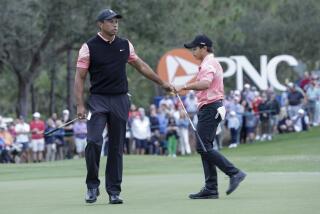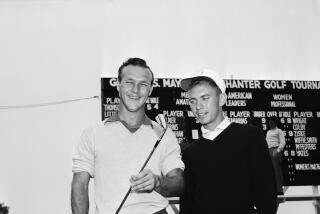A Not-So-Easy Ryder for U.S.
- Share via
Golf is a unique game for a lot of reasons, so far outside the usual run of pro athletics, it almost seems un-American. Not only do these guys call penalties on themselves, they don’t need squads of guys in striped shirts to keep them honest, they pay to play, they don’t have multiyear, million-dollar contracts, they make only what they win. They’re the last of the rugged individualists.
And they love to play for their country.
If you don’t think that makes them unusual, you have only to hark back to the time when basketball players, like the then-Lew Alcindor, refused to play in the Olympic Games for the United States. You have only to check any Davis Cup seedings to see how many tennists turn down patriotism for money.
Golfers must just not understand the situation.
Consider this: On Sept. 26-29 this year, they can go play golf for America at Kiawah Island in South Carolina and get the munificent sum of $4,000 and all the golf balls they can use. That same week, any one of them could tee it up in the Buick Southern Open and make a nice round $180,000 for winning--and any of them could make $4,000 by just making the cut or finishing 32nd.
Let me ask you something. If you had a choice between spending a weekend earning $4,000 and a monogrammed sweater with a flag sewn on the sleeve--or making $180,000 beating a mediocre field of pro golfers, which would you take?
If you stopped three people on the street and asked them what a Ryder Cup was, chances are they all would frown and guess it was a yacht race or a British horse race over hedges or something you won in a Formula One race car.
If you asked a golf pro what it was, you would think it was the Holy Grail. A golf pro wants to win three things in his career--a U.S. Open, a million dollars and a Ryder Cup.
There are 144 of the nation’s top players teeing it up at the 1991 Nissan Los Angeles Open this week at Riviera. They’d all like to win but, failing that, to a man, they’d like to pile up some Ryder Cup points. They want to spend a September weekend in Kiawah. Golf is not ordinarily a team game, but it becomes one every two years when the Ryder Cup comes up.
Golfers are a breed apart in this respect. In other sports, a player can lose an international match--in the unlikely event he deigned to play in it in the first place--with a shrug.
But when the U.S. team failed to bring back the Ryder Cup from Europe two years ago, tears were shed. Guys who could be philosophical over missing a four-foot putt to win the Masters, who could come manfully to the press tent after hitting a U.S. Open out of bounds, broke down when they fell apart playing for the country.
At the Bob Hope Classic in Palm Desert last week, when Tim Simpson was leading after three rounds, he spent as much time in the press tent complaining that he had been passed over for the Ryder Cup two years before, even though he had been 11th on the Ryder point list, as he did discussing his round. It’s that important to the American pro.
There’s a special urgency to the Ryder Cup this year. This is a competition that used to be as one-sided as a flood. The idea of a British seed merchant named Samuel Ryder, who posted a solid gold trophy bearing his name, it pitted the best Britain could offer against the best Americans. From 1935 through 1983, the Brits won once.
In 1979, the format was modified. In what came to be known as the find-a-way-to-get-Seve Ballesteros-in-here rule, the British side was expanded to include other European players. The American edge promptly diminished till, by 1983, it was gone. The Americans haven’t won the last three.
This is an embarrassment akin to losing a bow-and-arrow shoot to Estonia. The Ryder Cup was thought to be as permanent an American fixture as Grant’s Tomb.
Being captain of a Ryder Cup team is as high an honor as the game can offer. Ryder Cup teams read like the “Who’s Who” of golf over the last half-century. Walter Hagen, Gene Sarazen, Paul Runyan, Byron Nelson, Sam Snead, Ben Hogan, Arnold Palmer, Jack Nicklaus played in this--for captains like Hogan, Snead, Lee Trevino, Palmer and Raymond Floyd.
Dave Stockton is the Ryder captain this year. Like the French generals in World War II, he could be pardoned for thinking he had been handed a disaster. Not his style.
Dave Stockton won 11 tour events, including the PGA national twice. If a single phrase or adjective could be applied to his game, it would be gritty, persistent, pesky. It was dominated by his absolute refusal to be discouraged. Stockton was never a bust-it-and-go-find-it player. In baseball, he would have been a hit-’em-where-they-ain’t player. He found the short way to the hole and then one-putted it. It wasn’t fancy, just effective.
Stockton takes the same approach to reclaiming the Ryder Cup. He sat on a bench the other day at the L.A. Open at Riviera, where he is a former champion, and discussed the challenge.
“First of all, you have to remember we didn’t lose the Ryder Cup matches last time--we halved them,” he began. “The Europeans didn’t suddenly turn into 12 Ben Hogans.”
The trick, Stockton feels, is to find the players who best match the conditions of play. Ryder Cup rules call for 10 of the 12 players to shoot their way in--they are selected by their point totals for the year. The two other players are picked by the captain. But he has to pick the compatible twosomes.
“I have tried to interest tournaments in having an alternate-shot shootout before each tournament,” says Stockton. “I want to find out the players who best complement each other. I want to match up the gambling type player with the recovery expert.”
He wants the players to visit the Ryder Cup site.
“I want them to get to know and like the golf course. I want them to feel they’re competing with the golf course, not the Europeans.”
It was an attitude that always marked Stockton’s play. He won his first PGA championship by playing Southern Hills CC in Tulsa, not runner-up Arnold Palmer, who was out-driving him by 30 yards a hole.
“I won my second (PGA championship) because Congressional (golf course outside Washington, D.C.) just had everybody ready to run screaming to the White House.”
Stockton wants a team that will not want to head for the clubhouse the minute it gets a few holes down.
“I get to pick the last two players,” he says. “I want guys who keep their poise. I want guys who will fit the team, not want it to fit them.”
Whoever he picks, he knows will want to play. Only one eligible player has ever declined the honor. Tom Weiskopf said he had a conflict with a long-planned hunting trip in 1977.
Why, Stockton is asked, do golfers not beg off, as athletes do in other sports where serving sport and country costs them so dearly?
“It’s the nature of the game,” insists Capt. Stockton. “You’ve got to remember these are guys who call fouls on themselves, who endure amateurs for charity’s sake, who used to play for their own money--it cost $1 for every thousand in the purse, till purses got up in the million-dollar range.”
Play for your country for $4,000?
“Most of these guys would pay that much to play,” Stockton insists.
Too bad they can’t slam dunk and return serve, too.
More to Read
Go beyond the scoreboard
Get the latest on L.A.'s teams in the daily Sports Report newsletter.
You may occasionally receive promotional content from the Los Angeles Times.










